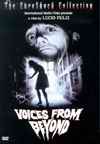Voices From Beyond
This 1990 film shows veteran Italian horror director Lucio Fulci attempting to meld the genres, which had made him a (gorehound’s) household name in the early ’80s. The result is a confusing film, which only offers some subtle touches of style. ’Voices from Byond’ opens with the mysterious death of Giorgio Mainardi (Dulio Del Prete), a rich tyrant who could be very cruel to those around him. Giorgio’s daughter, Rosy (Karina Huff) returns home from college for the funeral, and immediately begins to suspect that something is wrong. It appears that Giorgio had recently crossed everyone in the household, so there were many people who wanted to see him dead. Through dreams, Giorgio’s restless spirit urges Rosy to investigate his death and discover the identity of the killer.
Fulci attempts to create a sinister atmosphere with ’Voices From Beyond’, but the majority of the film comes off as a bit silly. Lying somewhere between ’Aenigma’ and ’City of the Living Dead’, the film is never very creepy, nor does it contain Fulci’s trademark gore. (I must say, however, that it was much better than ’Demonia’!) The dream sequences are interestingly shot and one of them does contain some pseudo-zombies, but this only makes one long for Fulci’s golden years. Also detracting from the film is the concept of Giorgio’s spirit. This simply consists of a (badly dubbed) voice-over speaking while the viewer is forced to look at a corpse. I must admit that I was surprised when the murderer was revealed in the finale, but that was not enough to make ’Voices >From Beyond’ anything other than a curiosity for Italian horror fans and another disappointing film from Fulci. And I’ve got to ask, why does the Mainardi family live in a house made entirely of paneling?
Image Entertainment spirits ’Voices From Beyond’ onto DVD, and the package is very similar to ’Aenimga’, their last Fulci release. The film is presented in an anamorphic widescreen, which has been letterboxed at 1.78:1. The image is very soft, displaying some noticeable artifacting at times. Otherwise, the image is clear, showing only a small amount of grain, and the colors are fine. The Dolby Digital Mono audio track does little to enhance the atmosphere of the film, but the dubbed dialogue is clear for the most part. I did notice some hissing on the track and some distortion during Giorgio’s voice-overs.

